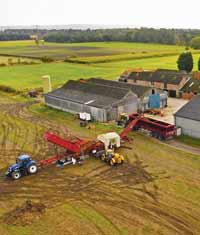Don’t tender too high for contract land

Little contract farming land is available and when it does come up, scarcity value can tempt some to tender higher bids than their businesses can stand.
For example, average quality combinable crop land attracts tenders of anywhere between £173 and £272/ha (£70 and £110/acre) as the contractor’s first charge.
“This is only a contribution to contracting costs, it is the total return that is important,” stresses Richard Levin of Brown & Co, Bury St Edmunds.
The contractor’s full return is made up from this first charge plus a share of any surplus made by the contract farming agreement after both farmer and contractor have been paid their first charges and after variable costs plus a contribution to fixed costs have been covered.
Within the range of tenders for average combinable crop land, most bids are between £198 and £247/ha (£80 to £100/acre) and there are valid reasons why different businesses would be able to bid different amounts for the same land.
However, contractors must be disciplined about attributing costs to the contract land and clear about why they are bidding at a certain level. For example, will the contract land suit their business rather than trying to make their business suit the contract land, says Mr Levin.
“Some contractors could make it work with a £70/acre contracting first charge, for example if they are well financed, but you have to remember that it is only the contracting charge which is guaranteed if things go wrong.”
Quality of tenders
Although the quality of tenders has improved markedly over the past decade, people can get carried away in their enthusiasm for more acres and some budgets clearly do not take account of all the costs which can be directly attributed to the contracting operation, hence the huge range, says Mr Levin.
“You need to earn a profit from this, otherwise there’s no point doing it. But if not all costs have been included, you could be misleading yourself about the profitability of the contracting operation and it may simply be a drain on your core business. For example, people often overlook the cost and practical implications of distances travelled.”
Also contractors need to ensure that they charge separately for odd extra jobs not covered in the tender, such as removing fallen trees.
“When we are looking for contractors, we will generally look at people within a 15 mile radius, because beyond that it is harder to make financial sense of it and in any case the farmer will often want someone who he can call on fairly quickly if necessary.”
Budgets need to include a sum to cover the contractor’s own time attributable to the contract land. “It wouldn’t be surprising if that comes out at about £10/acre if you take into account all the driving, organising, paperwork and ordering involved in taking extra land, even if the contractor is not doing field operations himself.”
Tax
Although it is strongly recommended for tax purposes that the farmer orders and is invoiced directly for all inputs, there are occasions in smaller contracts where contractors order agrochemicals on their own account for contract land to simplify paperwork, and then invoice the contract account in turn for these. Contractors need to beware of finding themselves funding a long wait for those payments out of the contract farming account, warns Mr Levin.
If there is inadequate or no grain storage, then central storage may be an option. The farmer and contractor need to consider cash flow to the contract farming account in their choice of pool. The long-term pool, for example, could delay the final division and distribution of the divisible surplus.
“While the farmer would probably put up the capital for central storage, the contract farming account would most likely carry the cost of the borrowing for this. However, if the farm is only producing straight feed wheat then it may be difficult to justify the capital and marketing cost of central storage,” says Mr Levin.
“The financial figures are important to both parties, but probably more important is the working relationship and the chemistry. This is a must for any contract arrangement to work and to succeed over hopefully a long period in what can be a very volatile market place.”
What a business can afford for contract land depends on many factors aside from the quality of the land. The budget should consider:• Current machinery and labour capacity • Current machinery and labour costs – fuel, depreciation, repairs, interest • Value of contractor’s own time in practical work or management contribution to contract farmed land • Contractor’s farm office/admin costs for contract land • If a one man band, what provision is there for cover in the event of illness/incapacity • Existing borrowing and limits – pressure that the extra acres will impose on this • Likely cash flow implications of contract farming account • Size of contract acreage in relation to existing business • Distance from land currently farmed • Reason for seeking contract land – whether to replace other Farm Business Tenancy (FBT) or contract land recently lost or for planned expansion • Profit level required • Need to be able to justify all figures in tender end |
|---|
